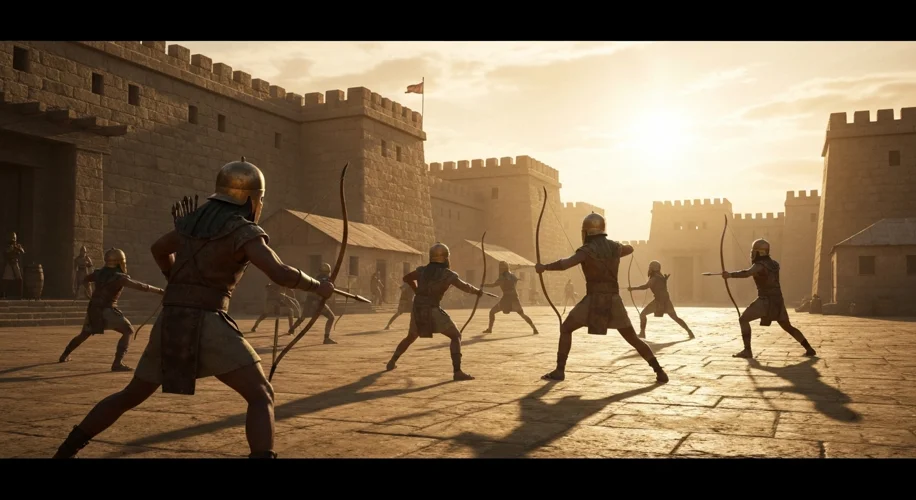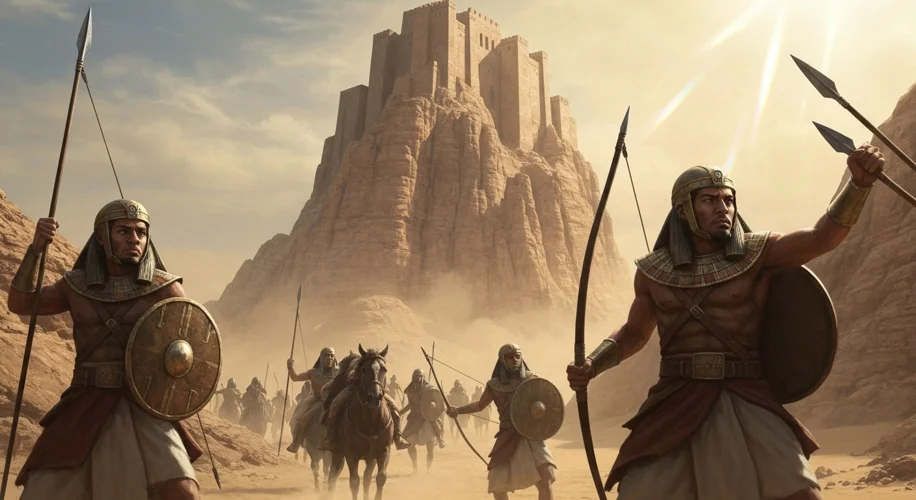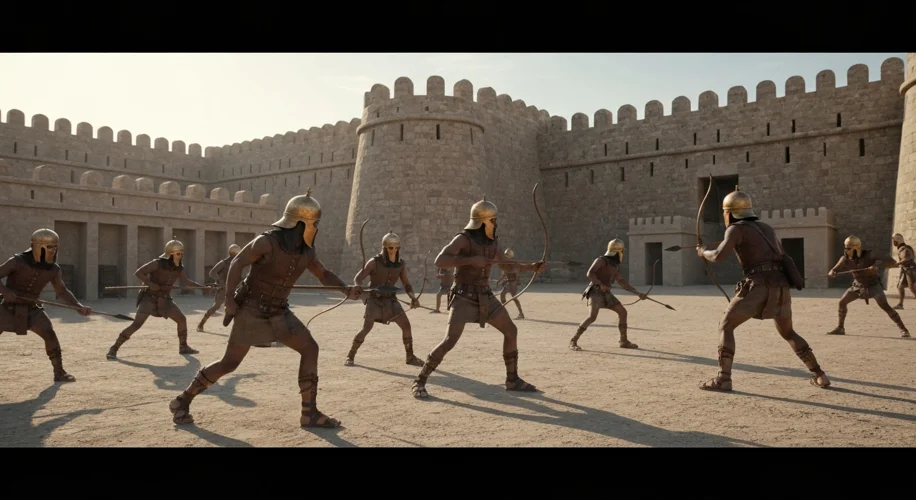The desert sun beat down relentlessly, a constant, oppressive force that seemed to bake the very sand into shimmering waves of heat. For the soldiers stationed at the formidable fortress of Buhen, on the southern frontier of Egypt around the time of the Middle Kingdom (circa 2055-1650 BCE), this was not a distant threat, but an ever-present reality. Life within these towering stone walls was a stark contrast to the fertile Nile valley, a life defined by vigilance, discipline, and the gnawing uncertainty of what dangers lurked beyond the horizon.
Imagine waking before dawn, the chill of the desert night still clinging to the air. The barracks, likely simple, functional structures, would stir with the sounds of men rousing themselves. Their armor, perhaps leather or even bronze for the more senior officers, would be donned, their weapons – sturdy bows, spears, axes, and khopesh swords – checked and re-checked. Breakfast would be a meager affair: flatbread, perhaps some dried lentils or beans, and water, always water, a precious commodity in this arid land.

Training was a relentless part of their existence. Hours were spent honing their skills in archery, spear-throwing, and close-quarters combat. Discipline was paramount. Disobedience or negligence could mean severe punishment, as the security of the entire region depended on their unwavering readiness. Officers, often drawn from the ranks of scribes or minor nobility, would oversee these drills, ensuring that every man was a sharp and effective part of the fortress’s defensive machine. The very act of building and maintaining the fortress itself was a form of labor that occupied many hours – repairing crumbling ramparts, clearing debris, and ensuring the water cisterns were full.
Their duties were varied and demanding. A primary role was to guard the southern border, a strategic location designed to protect Egypt’s lucrative trade routes to Nubia, a land rich in gold, ivory, and exotic goods. Patrols would venture out from the fortress, sometimes for days, scouting the surrounding territory for potential incursions by nomadic tribes or hostile Nubian groups. These patrols were not for the faint of heart; they involved navigating treacherous terrain, enduring the harsh climate, and always being on alert for ambush.

Inside the fortress, life continued under the watchful eye of the garrison commander. They were responsible for enforcing Egyptian law, collecting taxes or tribute from local populations, and ensuring the smooth flow of trade. Justice, swift and often brutal, would be meted out for any transgressions. For the common soldier, however, the days were a monotonous cycle of guard duty, training, and the ever-present weight of expectation.
The psychological toll of such an existence cannot be overstated. Living in a constant state of vigilance, far from the comforts of home and family, would have been incredibly taxing. The isolation, the unending desert, and the ever-present threat of violence could wear down even the most stoic individual. Rumors and anxieties would undoubtedly spread through the barracks – whispers of distant battles, of loved ones back home, or of the next rotation that might bring a return to civilization.
Fortresses like Buhen were not just military outposts; they were microcosms of Egyptian society, albeit a society under constant pressure. Alongside the soldiers, there would have been artisans, laborers, priests, and administrators, all contributing to the functioning of this vital frontier hub. Their lives, too, were intertwined with the military’s presence, their security dependent on the soldiers’ dedication.
What did these soldiers eat when not on patrol? Rations were basic but sustained. Barley and emmer wheat formed the staple for bread, supplemented by dates, figs, vegetables like onions and garlic, and occasionally fish or fowl if the Nile or local hunting provided. Beer, a thick, nutritious staple of the Egyptian diet, would have been a welcome if meager part of their sustenance. Their pay might have been in kind – a portion of grain, some oil, and perhaps even land grants for long service, a powerful incentive for loyalty.
The threat was not always external. The very desert could be an enemy, with sandstorms capable of burying fortifications and blinding soldiers. Water scarcity was a perpetual concern, and the complex irrigation and cistern systems were crucial for survival. Disease, too, was a constant menace in crowded living conditions, and medical care would have been rudimentary at best, often relying on the skills of a fortress medic or physician.
Life as a soldier in an ancient Egyptian fortress was a far cry from the romanticized tales of glory. It was a life of hard duty, unyielding discipline, and the constant awareness of being on the edge of a powerful civilization. Yet, it was also a life of immense importance, a crucial element in the vast machinery that maintained the pharaoh’s dominion and secured the prosperity of Egypt for centuries. These were the unsung guardians, the stoic sentinels whose vigilance allowed the heart of Egypt to flourish, undisturbed by the whispers of the wild lands beyond their imposing walls.
Tags: Ancient Egypt, Military History, Frontier Life, Soldier’s Experience
Categories: Ancient History, Military History, Social History
Image Prompt: A detailed illustration of a bustling ancient Egyptian fortress interior. Soldiers are seen sharpening weapons, mending armor, and receiving rations. In the background, artisans work at a forge, and a scribe records inventory. The scene is under a bright desert sun, with imposing stone walls and barracks visible.

